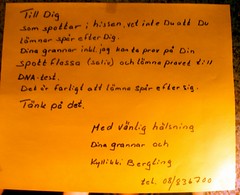January 02, 2009
Good forensics make good neighbors?
 It is dangerous to leave traces...
It is dangerous to leave traces...
I found this sign in a friend's apartment complex, threatening whoever is spitting in the elevator with DNA fingerprinting. It is a weird mixture of nosy/annoyed neighbors and CSI.
DNA fingerprinting is a bit too expensive today for neighbors to do, but that is going to change. Do we want it to happen? It is not entirely clear it can be prevented. Although laws may forbid it and it might not be usable in court, once it is cheap and easy to identify DNA samples nosy people will do it. The main use would be within the local social network rather than in any formal sense - being able to prove that a certain person known to the neighborhood has behaved badly can have a real effect on behavior.
The main challenge would be to get a reference sample from people. This is where neighbors might actually refuse on privacy grounds - but the social pressures of cooperating would also be strong.
If neighborhood DNA fingerprinting appears science fictional, consider the increasing availability of surveillance cameras (it is easy to put a webcamera in one's window) or even fingerprint collection.
The difference from the old world of having nosy neighbors that saw what was going on and enforced consensus behavior is that modern technology can extend their reach. This is not always a bad thing: making people spit less in public spaces is pretty OK. As urbanization makes us live within more anonymous communities technologically augmented nosiness actually could help keep the community norms together better. The downside is 1) over-reach, where neighbors get intrusive in private areas and 2) enforcement of particular norms that are not the community norms, just certain individual's. One can imagine a bigoted neighbor using technology to detect and socially punish swearing or what they consider inappropriate love.
The real way of preventing excessive nosiness is to push back. The technology is hard to stop or detect, but inappropriate social use is easily detectable (since the neighbor will have to tell others). If technologically augmented social pressure is accepted, then it will be used. But if the response to such pressure is indignation and increased surveillance of the nosy neighbor (demanding transparency and equal moral standards) it will be inhibited. In a real community there will be a negotiation about the standards used.
The risk is that anonymous urban communities allow surveillance and some social pressure (like announcing who broke a social rule) without negotiating the social standards. This seems to be the crucial problem, not the existence of surveillance. If communication only occurs through notes in the elevator it will be hard to agree on what is appropriate behavior.